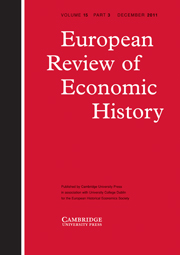Article contents
Episodes in catching-up: Anglo-French industrial productivity differentials in 1930
Published online by Cambridge University Press: 11 January 2005
Extract
The secular process of convergence in income and product per capita among industrial countries has attracted much well-deserved attention. In Western Europe especially, the cradle of modern industry, this attention has focused on the ways in which ‘follower countries’ have caught up with (or fallen behind) the long-time ‘regional’ technological leader, Great Britain. In this context, a long tradition considers France as offering the standard alternative to modern British economic institutions and development (Kindleberger 1964). With regard to economic performance, however, it is only recently that claims have been backed by systematic quantitative evidence. Despite sometimes conflicting interpretations, a consensus view has gradually emerged (Crouzet 2003) which concludes that the Anglo-French gap in income and productive capacity slowly closed from the mid-nineteenth to the mid-twentieth century, reconciling ex post calculations with some of the conclusions of enlightened contemporaries and later historians (Bairoch 1982, Crafts 1984). After World War II and the introduction of standardised national accounts, the course of productivity and real income per head in both countries is much better documented and suggests the completion of the secular catching-up process by the 1960s (Van Ark 1990). However, between the ‘controlled conjectures’ of the pre-World War I era and the quasi-certainties of post-1945, the interwar years still remain a grey zone. During the 1920s, Britain's industry, marred by industrial unrest, mass unemployment and loss of competitiveness, is supposed to have fared especially poorly compared with its competitors, Germany and the US. In a book published in 1931, a French scholar, André Siegfried, claimed that Britain was descending along the path of industrial decline (Siegfried 1931). By this time, France had completed its postwar reconstruction, the value of the franc had been stabilised, and the French economy was in full swing: in 1930 French public opinion basked complacently in the belief that the country would be spared the devastating effects of the depression sparked by the Wall Street crash.
- Type
- Research Article
- Information
- Copyright
- © Cambridge University Press 2004
- 4
- Cited by




